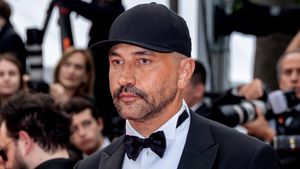CONTACTAbout UsCAREER OPPORTUNITIESADVERTISE WITH USPRIVACY POLICYPRIVACY PREFERENCESTERMS OF USELEGAL NOTICE
© 2025 Equal Entertainment LLC.
All Rights reserved
All Rights reserved
By continuing to use our site, you agree to our Private Policy and Terms of Use.
Two thirds of the members serving on an expert medical panel investigating a U.S.-funded AIDS study are receiving grant money from the federal agency at the center of the probe, according to documents and interviews. The Institute of Medicine said it was aware of the financial ties with six of the nine members of its expert panel but approved their participation because they have special expertise, receive only a minority of their overall funding from the National Institutes of Health, and won their grants competitively. The six panel members are receiving funds from NIH ranging from $120,000 to nearly $2 million a year, according to agency records and interviews by the Associated Press. IOM, the nation's health adviser, believes the panel's ultimate conclusions about NIH's controversial AIDS study in Africa won't affect the members' NIH funding, and thus there is no conflict of interest, spokeswoman Christine Stencel said. "When you get into some of these fields or areas, you are not talking about a really huge pool of experts who can be candidates or experts," Stencel said. "In this case a lot of the great candidates potentially would have had funding from NIH. Do you keep off of your committee every great expert out there because they can't have a single penny from NIH or do you strive for a balance, keeping any possible connection like that to an absolute best possible minimum?" Stencel said IOM rejected two other potential members because they received a majority of their funding from NIH or drug companies tied to AIDS research. The chairman of the Senate Finance Committee said he is concerned the researchers' financial ties to NIH create a conflict of interest that sullies any conclusions they make. "If there's financial interest, there's a conflict, and that's a factor to consider when sizing up objectivity," said Republican senator Charles Grassley of Iowa. Frequently the government has appointed experts to scientific panels even though they had connections to the issues, companies, or agencies they were investigating. For instance, federal drug regulators recently acknowledged that some advisory panel members who recommended pain killers stay on the market had ties to the makers of the drug. Legal and medical ethicists said IOM likely didn't violate any laws but should have done more to alert the public to the financial conflicts in the NIH case, especially because the panel members have an ongoing financial relationship with the agency. "Essentially, what the public will want to know about this report is is this a whitewash or is it actually independent," said Kathleen Clark, a government ethics expert at Washington University in St. Louis. "It is interesting that they [IOM] revealed this only in response to an inquiry from Senator Grassley and from the media. That's problematic," she said. (AP)
From our Sponsors
Most Popular
Latest Stories
Donald Trump just spent a week showing us how much he despises children
May 03 2025 5:51 AM
Texas man sentenced for shooting trans woman while on bond for murder
May 02 2025 2:54 PM
The 11 sultriest sapphic femmes and lesbians in film and TV history
May 02 2025 8:31 AM
All about the Daughters of Bilitis, the first U.S. lesbian rights group
May 03 2025 5:35 AM
WV Gov. Morrisey signs bill closing gender-affirming care 'loophole'
May 02 2025 11:24 AM
MSNBC fires back at disinformation — and makes history — with fearless new show
May 02 2025 5:00 AM
Our favorite 15 destinations from 'Lonely Planet's new LGBTQ+ travel guide
May 02 2025 3:41 PM
‘Overjoyed’ HRC President Kelley Robinson and wife Becky George welcome second child
May 02 2025 11:31 AM
Trending stories
Recommended Stories for You












































































